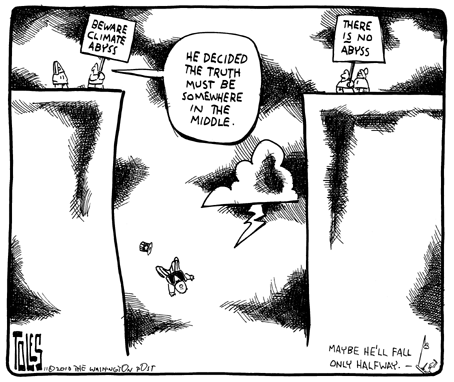I want to talk about a metaphor that occurred to me recently, but before I do, I want to emphasize that it is just a metaphor. I realize that there is a huge difference between blowing up innocent people and endeavoring to keep unemployment rates high. But with that said, even if the actual implementations of the two strategies differ, the strategies themselves have some interesting similarities.
The strategies I’m referring to, if you haven’t figured it out already, are those of the post-war Sunni insurgency in Iraq and the post-2008 Republican party in the US. In each case there was a group that had been toppled from power and wanted very much to get that power back. In each case the “official” levers of power were unavailable. In Iraq, the Army had been defeated militarily and then disbanded, and de-Baathification had removed Sunnis from power throughout the new government. In the US, Republicans had lost the White House, and, following on the 2006 loss of the House, they now had also lost the Senate (though it took a while for the Senate majority to actually change hands).
In each case the newly out-of-power group couldn’t do much within the system. They couldn’t run things, couldn’t propose or pass legislation, and couldn’t build goodwill with the population by delivering things that make peoples’ lives better. But in each case they could, if they chose, prevent their newly empowered adversaries from succeeding in doing any of those things. And that’s exactly what they did.
In Iraq the Sunni insurgency launched an underground war, both upon the American occupiers and upon the Shiite majority. Their preferred method of attack was the IED, the roadside bomb that killed American servicemen and women in their humvees or turned hundreds of mostly-Shiite civilians at markets and mosques into bloody body parts. Their goal was not to defeat the invaders or the Shiite ruling regime directly. It was to make the country ungovernable, to make things as horrific and chaotic as they could, to upset their opponents’ apple cart as a necessary first step in the eventual reacquisition of their own power.
In the US, the newly dis-empowered Republican party adopted the (again, metaphorically) similar strategy of denying Obama and his Democratic allies any easy legislative victories. In that fight they didn’t have much to work with, but they did have one thing: the Senate filibuster. So they used it, and used it at a record pace, blocking votes on virtually everything, including not only Democrats’ legislative priorities, but also normally-routine appointments to judgeships and government agencies. As a result they were able to kill or substantially hinder nearly every part of Obama’s agenda. Even on the one big battle that they lost (healthcare reform), they managed to turn it into something of a Pyrrhic victory for the Democrats, chewing up vast amounts of time and Obama’s political capital, with the resulting legislation being watered down significantly.
Today, with the Republican party having re-won the House in the 2010 elections, they have an opportunity to go further, setting off even more “roadside bombs” (legislatively speaking). Among the things they can do, if they’re willing to, is to fight tooth and nail to make sure the government doesn’t do anything that might reduce the unemployment rate. They might go as far as forcing a government shutdown, blocking spending and helping to nudge the country back into the recession it has slowly been creeping out of. They can try to pressure the Fed not to take any actions that might stimulate economic growth. By doing so, they can maximize their chances of retaking the White House in 2012. Of course, they will also be choosing a strategy that keeps the economy sluggish and unemployment rates high.
That’s the sense in which the Republican strategy feels to me like the Sunni insurgency: By engaging in economic sabotage, they are willing to hurt the people of their own country merely because it helps their own chances of future power. It amounts to putting party before country in a way that I find really repellent, and that I tend to believe would strike those on the opposite side of this debate (by which I mean, conservatives) as equally repellent, if they actually believed it was happening. Which I assume they don’t believe, or else they would not support the kind of leadership that would engage in it.
Some links about this:
Me:
I, for one, welcome our new Tea Party overlords: My own post-election comment here, in which I first talked about a Republican party “willing to wield the filibuster as the legislative equivalent of a roadside bomb.”
Steve Benen:
GOP poised to kill tax-extenders bill, None dare call it sabotage and Krugman fears ‘Making America ungovernable’. Benen is the guy who took over Kevin Drum’s political blogger post at the Washington Monthly when Drum moved on to Mother Jones. Benen is often too doctrinaire in his liberal leanings for my taste, but if you’re willing to take that into account when reading him he makes some valid points.
Here’s a quote from the middle one of those three items:
For months in 2009, conservatives debated amongst themselves about whether it’s acceptable to actively root against President Obama as he dealt with a variety of pressing emergencies. Led by Rush Limbaugh and others, the right generally seemed to agree that there was nothing wrong with rooting against our leaders’ success, even in a time of crisis.
But we’re talking about a significantly different dynamic now. This general approach has shifted from hoping conditions don’t improve to taking steps to ensure conditions don’t improve. We’ve gone from Republicans rooting for failure to Republicans trying to guarantee failure.
Paul Krugman:
Axis of depression and There will be blood. Again, with Krugman you know you’re going to get an unabashedly liberal take. But that doesn’t mean you get to dismiss his arguments out of hand. (Well, if you’re the type who accepts the Fox News propaganda at face value, I guess it does. But at least speaking for myself, I feel like I have an obligation to consider the arguments that Krugman makes, and figure out why he’s incorrect, if I want to believe he is.)
From the latter Krugman piece:
Right now, in particular, Republicans are blocking an extension of unemployment benefits – an action that will both cause immense hardship and drain purchasing power from an already sputtering economy. But there’s no point appealing to the better angels of their nature; America just doesn’t work that way anymore.
And opposition for the sake of opposition isn’t limited to economic policy. Politics, they used to tell us, stops at the water’s edge – but that was then.
These days, national security experts are tearing their hair out over the decision of Senate Republicans to block a desperately needed new strategic arms treaty. And everyone knows that these Republicans oppose the treaty, not because of legitimate objections, but simply because it’s an Obama administration initiative; if sabotaging the president endangers the nation, so be it.
Matt Yglesias:
Planning for the worst:
So I know that tangible improvements in the economy are key to Obama’s re-election chances. And Douglas Hibbs knows that it’s key. And senior administration officials know that its key. So is it so unreasonable to think that Mitch McConnell and John Boehner may also know that it’s key? That rank and file Republicans know that it’s key? McConnell has clarified that his key goal in the Senate is to cause Barack Obama to lose in 2012 which if McConnell understands the situation correctly means doing everything in his power to reduce economic growth. Boehner has distanced himself from this theory, but many members of his caucus may agree with McConnell.
Which is just to say that specifically the White House needs to be prepared not just for rough political tactics from the opposition (what else is new?) but for a true worst case scenario of deliberate economic sabotage.
Stan Collander:
Bitter GOP criticism of the Fed may be ahead and GOP criticism of the Federal Reserve was both predictable and predicted. Collender looks at the specific case of the Federal Reserve, and its role (or non-role) in helping the country get out of the recession.
Jonathon Chait:
It’s not a lie if you believe it. With a title like that, how could I not find it compelling? Chait falls into the “no, they wouldn’t intentionally sabotage the economy” camp:
Still, I think you have to be careful about making assumptions about motive like this. Establishing motive is always very hard to prove. What’s more, the notion of deliberate sabotage presumes a conscious awareness that doesn’t square with human psychology as I understand it. People are extraordinarily deft at making their principles — not just their stated principles, but their actual principles — comport with their interests. The old Upton Sinclair quote — “It is difficult to make a man understand something when his salary depends upon him not understanding it” — has a lot of wisdom to it.
I don’t think many Republicans are actually trying to stop legislation that might help the economy recover because they know that a slow economy is their best route to regaining power. I think that when they’re in power, consequences like an economic slowdown or a collapsing industry seem very dire, and policies to prevent this are going to sound compelling. When you’re out of power, arguments against such policies are going to sound more compelling.
Faiz Shakir:
Mitch McConnell: I want to be Senate majority leader in order to make Obama a one-term president. Shakir talks about a pre-election admission by Mitch McConnell that defeating Obama in 2012 is the “single most important thing” he would have done as majority leader in the Senate.
Kevin Drum:
Forecasting 2012 and The liberal noise machine. Drum is my favorite political blogger. The thing I like most about his writing is that he retains an ability to make up his own mind, based on his own research, independent of what ideology might dictate. He seems largely immune to the “my side is always right, even when it’s wrong” mindset that plagues so much of our national discourse. Here’s his take on the “are they intentionally sabotaging or not?” question:
POSTSCRIPT: For what it’s worth, my own view isn’t that Republicans are consciously trying to sabotage the economy. Rather, I think it’s really easy to convince yourself of things that are in your own self-interest, and that’s mostly what they’ve done. A bad economy is in their self-interest, so they’ve convinced themselves that every possible policy to improve things is a bad idea.
I’m willing to believe that people like Chait and Drum are right: Republicans would not intentionally hurt the country in order to help their own electoral prospects. But that’s small comfort, given that I also believe that by deluding themselves as they have into believing that opposing everything Obama wants will be good for the country, they have talked themselves into a strategy that actually does harm the country in real ways. We have real problems that need to be addressed, and by reflexively opposing everything Obama proposes, they are preventing even those actions that might be agreeable to both sides from being taken.


